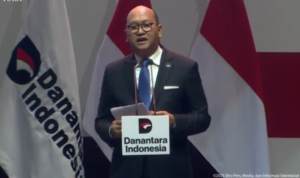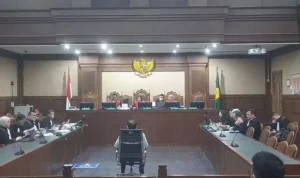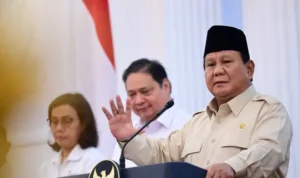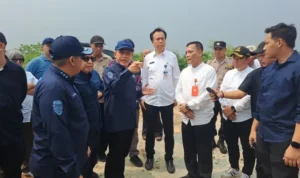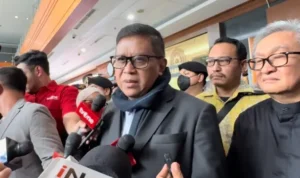INDONESIAUPDATES.COM, News En – As Indonesia moves into 2025, the government under President Prabowo Subianto has announced a series of strategic economic policies aimed at stimulating growth and supporting citizens. These initiatives, which include fiscal stimulus packages and targeted social welfare programs, are designed to bolster economic recovery and address pressing national issues.
THR Disbursement for Civil Servants and Private Workers in March 2025
One of the most anticipated announcements is the confirmation that Tunjangan Hari Raya (THR), or the Holiday Allowance, will be disbursed to both civil servants (ASN) and private sector workers in March 2025. This measure is part of the government’s broader plan to provide financial relief to citizens ahead of the national Ramadan and Lebaran holidays. The disbursement is expected to boost consumer spending, thereby contributing to economic momentum during the festive season.
Increase in Provincial Minimum Wages (UMP) for 2024
In addition to the THR disbursement, President Prabowo also announced an increase in the 2024 Provincial Minimum Wage (UMP). This adjustment aims to improve the purchasing power of workers, particularly in low-income sectors, and ensure that they can better cope with inflation. By raising wages, the government is directly addressing the needs of the workforce and enhancing their ability to contribute to the economy.
Stimulus for Ramadan and Lebaran 2025
To further support the economy during the peak festive season, the government is introducing various stimulus measures for the upcoming Ramadan and Lebaran holidays:
-
Discounted Airfare and Toll Rates: The government will work with transportation providers to offer discounted flight tickets and toll road fees, making travel more affordable for families.
-
Harbolnas 2025 & Other Shopping Discounts: National online sales events, including Harbolnas, EPIC Sales 2025, and BINA Diskon 2025, will offer significant discounts to consumers, encouraging spending in retail and e-commerce sectors.
-
Tourism Incentives for Mudik: Aimed at boosting the domestic tourism sector, the government will provide incentives for those returning to their hometowns (Mudik), supporting the tourism industry and the broader economy.
-
Food Price Stabilization: Ensuring that food prices remain stable during this period is another key priority to avoid inflationary pressures on the population.
Economic Stimulus Package
The government is also rolling out a comprehensive economic stimulus package, which includes:
-
Discounted Electricity Tariffs: To ease the burden on households and businesses, especially small and medium enterprises, the government will implement lower electricity rates for certain sectors.
-
Tax Relief for Electric Vehicles and Hybrid Cars: In a bid to promote environmentally-friendly transport, tax incentives will be provided for electric and hybrid vehicles, as well as subsidies for electric motorcycles.
-
Tax Incentives for Labor-Intensive Sectors: To support industries that rely heavily on manual labor, the government is offering tax relief to encourage growth in these sectors.
Optimized Distribution of Social Welfare
The government is prioritizing the efficient distribution of social welfare programs, including:
-
PKH, Kartu Sembako, PIP, KIP, and BLT-DD: These programs, which target low-income families, will see optimized distribution in February and March 2025, providing immediate financial relief to those who need it most.
-
Free Nutritious Meals Program: In an effort to combat malnutrition, the government is rolling out free nutritious meals to vulnerable populations.
Support for Agricultural and Rural Development
The government’s commitment to supporting agriculture and rural development is evident through the implementation of policies aimed at ensuring optimal rice harvests. This will not only increase food security but also contribute to economic growth in rural areas.
The economic policies outlined by President Prabowo Subianto and his administration for the first quarter of 2025 are ambitious yet necessary steps to help Indonesia recover from economic challenges. By focusing on income support, stimulating consumer spending, and incentivizing sustainable practices, these measures aim to build a stronger, more resilient economy for the future. The government’s focus on improving wages, providing social welfare, and encouraging economic activities through various discounts and tax relief is likely to provide a much-needed boost to both individuals and businesses.
FAQ: Economic Stimulus Measures in Indonesia for 2025
1. What is Tunjangan Hari Raya (THR) and when will it be disbursed in 2025? THR is a holiday allowance given to civil servants (ASN) and private workers in Indonesia before the religious holiday of Ramadan and Lebaran. In 2025, the government has confirmed that THR will be disbursed in March 2025 to both ASN and private sector employees.
2. How will the increase in Provincial Minimum Wages (UMP) benefit workers? The increase in UMP for 2024 aims to improve the purchasing power of workers, especially in low-income sectors. By raising wages, workers will have more financial capacity to cope with inflation and contribute to consumer spending, which boosts the economy.
3. What stimulus is provided for the Ramadan and Lebaran holidays? The government is offering several stimulus measures to support the economy during Ramadan and Lebaran, including:
- Discounted airfare and toll rates.
- Major shopping discounts during Harbolnas 2025, EPIC Sales 2025, and BINA Diskon 2025.
- Tourism incentives for the annual “Mudik” (homecoming) journey.
- Stabilization of food prices to prevent inflation during the holiday season.
4. What does the economic stimulus package for 2025 include? The government has introduced a comprehensive stimulus package that includes:
- Discounted electricity tariffs for households and businesses.
- Tax relief for electric and hybrid vehicles.
- Subsidies and tax incentives for electric motorcycles.
- Tax incentives for labor-intensive sectors to promote job creation.
5. How will social welfare programs be improved in 2025? The government plans to optimize the distribution of social welfare programs like PKH, Kartu Sembako, PIP, KIP, and BLT-DD in February and March 2025, ensuring that financial aid reaches those who need it most. Additionally, free nutritious meals will be provided to vulnerable populations to address malnutrition.
6. How is the government supporting agriculture and rural development in 2025? The government is prioritizing the agricultural sector by ensuring optimal rice harvests in rural areas. This will help improve food security and contribute to economic growth in rural communities, benefiting both farmers and the broader economy.
7. How do these policies aim to help Indonesia’s economic recovery? These policies are designed to stimulate economic growth by increasing disposable income for workers, supporting consumer spending, promoting sustainable practices, and addressing the needs of vulnerable populations. The government’s efforts aim to create a more resilient and equitable economy.
FOLLOW INDONESIAUPDATES.COM ON GOOGLE NEWS



